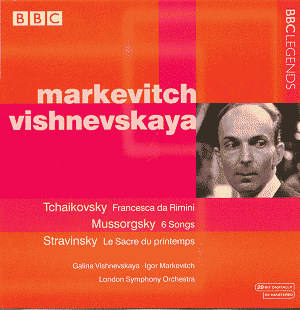Igor Markevitch in
Concert
Peter TCHAIKOVSKY (1840-1893)
Francesca da Rimini, Op. 32.
Modest MUSSORGSKY (1839-1893)
Songsa Lullaby; The magpie; Night; Where are thou,
little star?; The ragamuffin; On the Dnieper.
Igor STRAVINSKY (1882-1971)
Le sacre du printemps.
 aGalina Vishnevskaya
(soprano); London Symphony Orchestra/Igor Markevitch.
aGalina Vishnevskaya
(soprano); London Symphony Orchestra/Igor Markevitch.
 BBC/IMG Artists
BBCL 4043-2 [ 74'44]
[ADD].
BBC/IMG Artists
BBCL 4043-2 [ 74'44]
[ADD].
Crotchet

Recorded live in the Usher Hall, Edinburgh on August 26th, 1962, this is
a document of what was obviously a remarkable concert. Markevich's iron hold
on the orchestra is obvious throughout. One of his trademarks was his ability
to extract a wide range of colour from the orchestral sonorities, and
Tchaikovsky's scandalously under-rated tone poem Francesca da Rimini
(vastly overshadowed by Romeo and Juliet) exemplifies this trait to
perfection. It is a sensitive rather than turbo-powered interpretation and
all the more effective for it.
The great soprano Galina Vishnevskaya is fully in her element in the Mussorgsky
songs. The initial Lullaby is gently inflected by both soloist and
orchestra. The third song, Night, is imbued by that particularly Russian
sense of nostalgia. The Ragamuffin provides a sense of fun: Vishnevskaya
positively relishes the cheeky accents. Time for a major gripe, however:
no texts or translations in sight. Surely that wouldn't be too much to ask?.
Markevich's Rite comes a welcome antidote to the orchestral showpiece
performances so difficult to get away from these days. The care put into
instrumental voicing in the Introduction immediately sets this version off
as special (all the more impressive as this is a live performance). The
Auguries of Spring have had more primordial outings, but this is because
Markevich never lets the listener forget that this is a work for the stage
(despite its popularity on the concert platform). This is a primarily balletic
performance, but one still alive to the enormous spirit of discovery inherent
in this piece. Thus the power of Games of the Rival Tribes comes from
a cumulative rhythmic force rather than from any short-term effects. Perhaps
the Ritual of the Ancestors could have a touch more pregnancy about
it (coming from the circular woodwind figures) to emphasise the ensuing
outbursts, but that is quickly forgotten as the spell of the Sacrificial
Dance takes over.
This is a remarkable disc. A must-hear Rite with such imaginative
and effective couplings is a bargain at any price. The recording is remarkably
detailed.
Reviewer
Colin Clarke
Performance

Recording

